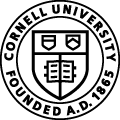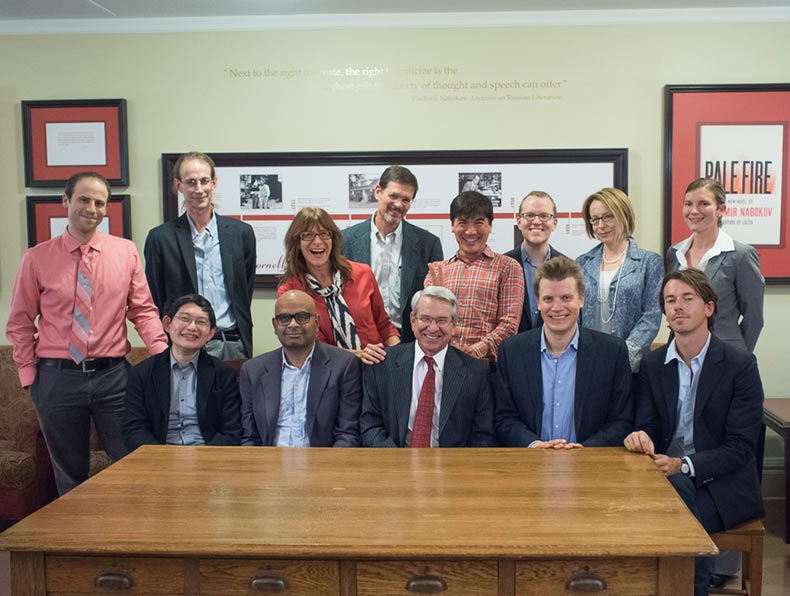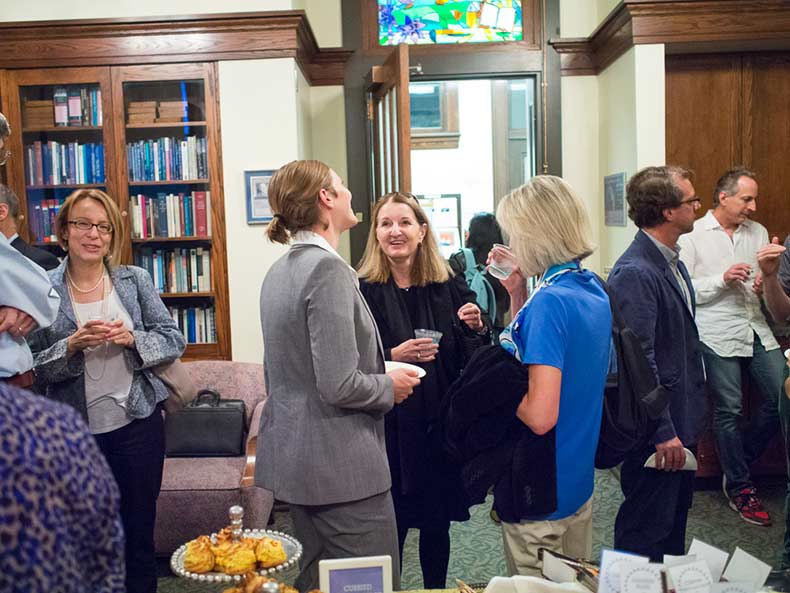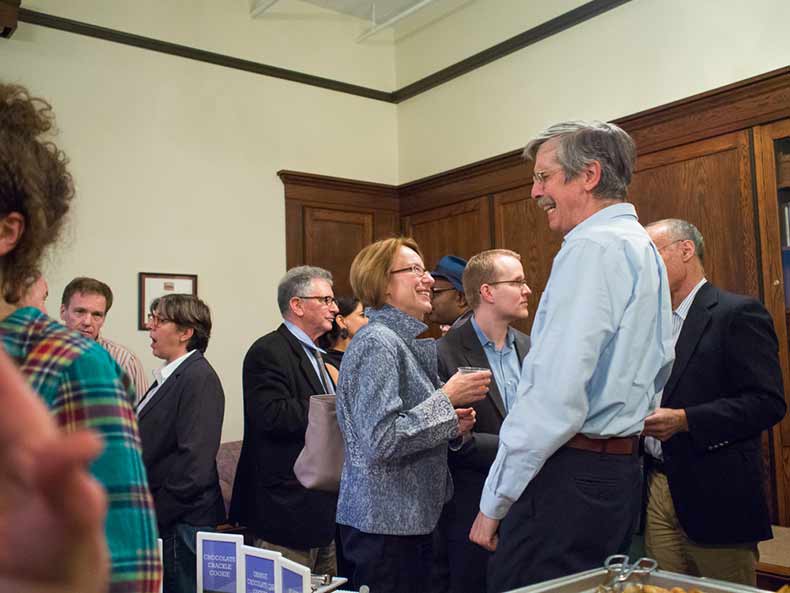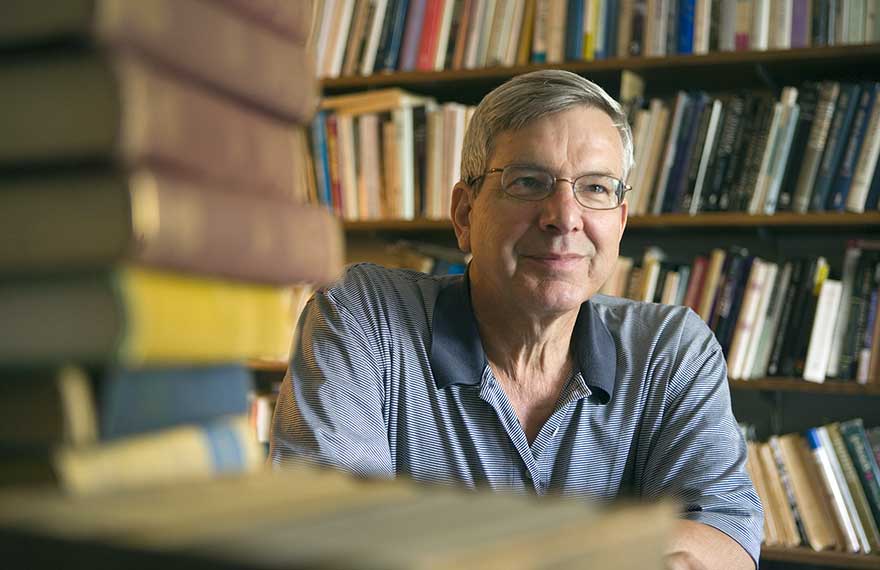
Literary Theory at Cornell: A Celebration
For a quarter of Cornell's 150-year existence, Jonathan Culler has helped shape the study of literary theory. His legacy includes the profound impact he's had on his students and colleagues.

Shaping Literary Theory
For a quarter of Cornell's 150-year existence, Jonathan Culler, the Class of 1916 Professor of English and Comparative Literature, has been teaching and writing at Cornell. On Oct. 3-4 a conference celebrated his 70th birthday and the many former and current students he's taught in his 37.5 years on the Hill.
"Jonathan Culler is a great scholar, thinker and teacher whose work has played an outsized role in shaping informed discussion of literary theory," said Marc Redfield M.A. '85, Ph.D. 90, chair of comparative literature at Brown University, who spoke at "Literary Theory at Cornell: A Celebration of Jonathan Culler and His Students."
"His legacy is that more than anyone else he has made theory – especially literary theory – a force to contend with," said Srinivas Aravamudan Ph.D. '91, professor of English, Romance studies, and the program in literature at Duke University.
Cathy Caruth, the Frank H. T. Rhodes Professor of Humane Letters, surprised Culler with the announcement that she'd arranged for two books to be published in his honor: a Festschrift of papers presented at the conference and other papers by Culler's former students, with Redfield as lead editor, and "The Jonathan Culler Reader," a collection of his writings to be edited by Culler's most recent graduate student, Avery Slater M.A. '11, Ph.D. '14, now a postdoc at the University of Texas, Austin.
Said Caruth, "[Culler] has had a vast impact on the literary theoretical scene in the late 20th and early 21st centuries through his outstanding books tracing the thought and development of theoretical innovations such as structuralism and deconstruction. The reader will give students and scholars a sense of the range of his important work and will also introduce them to important articles of which they may not have been aware."
But while Culler's books are widely available – they've been translated into more than 25 languages — "the experience of live transmission remains significant," said Ann Cvetkovich M.A. '85, Ph.D. '88, the Ellen C. Garwood Centennial Professor of English at UT Austin. "I was excited to have the opportunity at Cornell to learn directly from Jonathan, who was a crucial emissary of theory not only through his books but in the scenes of reading and pedagogy around him." In her talk she recalled a class Culler taught called "On Deconstruction" the year before the publication of his book with that title. The crowded classroom included not just graduate students but junior faculty members as well, all eager for an advance preview of the heralded book.
Cvetkovich also recalled an exciting guest lecture by Jacques Derrida that Culler organized for his then-new Literary Theory survey class – a version of which he is currently co-teaching with Cathy Caruth, Frank H. T. Rhodes Professor of Humane Letters.
"Jonathan's record of mentoring and training graduate students is arguably the most impressive of his many accomplishments, as the truly stellar lineup of the conference panels illustrates," said English chair Roger Gilbert, noting that Culler typically has more graduate students than anyone else in the department. "Despite his busy writing and speaking schedule, he's been remarkably generous in his readiness to work with students in an amazingly diverse range of fields."
"A teacher's not just a person standing in a classroom lecturing, but someone you want to emulate who launches you on your career," noted Aravamudan. "If you gave [Culler] a dissertation chapter he'd have it read in a week with lots of helpful comments."
Added Cvetkovich, "Jonathan's mentorship of grad students took place not just through courses and dissertation supervision but through the other kinds of professional opportunities he generously made available to them -- including serving as TAs for his introduction to theory course or as research assistants for his books and other publications. These experiences helped shaped people's professional identities as theorists and helped them to get jobs."
Many of the conference speakers emphasized Culler's lucid writing and how he conveys the force and significance of concepts as fairly and accurately as possible. Culler is an expert in multiple fields – deconstructionism, structuralism, lyric poetry, and more -- "and even when there are other books on the same topic his books tend to be the best because they are the clearest, subtlest, most nuanced in the way they give accounts of extremely complicated theoretical ideas," noted Gilbert.
Said English professor Harry Shaw, "Jonathan has helped to create a lively intellectual life here at Cornell, in and beyond his home departments of English and Comparative Literature. He is a brilliant reader of other people's work, showing you things you didn't see in your own writing, and he's generous in agreement and disagreement."
And, said Shaw, he's been a very successful administrator: chair of three departments (English, comparative literature, Romance studies), a senior associate dean, and director of the Society for the Humanities. And he just served on the committee helping select Cornell's new president.

